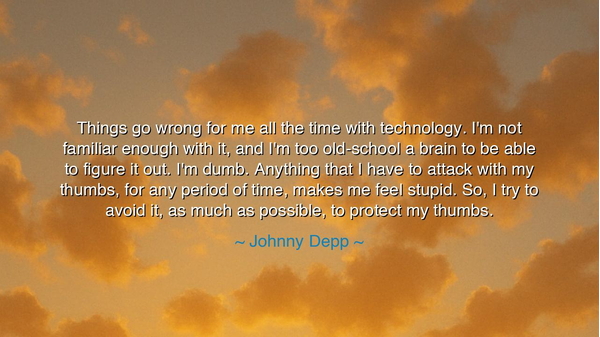
Things go wrong for me all the time with technology. I'm not
Things go wrong for me all the time with technology. I'm not familiar enough with it, and I'm too old-school a brain to be able to figure it out. I'm dumb. Anything that I have to attack with my thumbs, for any period of time, makes me feel stupid. So, I try to avoid it, as much as possible, to protect my thumbs.






Hear the words of Johnny Depp, spoken with a mixture of jest and truth, that mirror the struggle of many in our age: “Things go wrong for me all the time with technology. I'm not familiar enough with it, and I'm too old-school a brain to be able to figure it out. I'm dumb. Anything that I have to attack with my thumbs, for any period of time, makes me feel stupid. So, I try to avoid it, as much as possible, to protect my thumbs.” Though wrapped in humor and self-deprecation, this confession unveils a deep truth about man’s uneasy bond with the ever-advancing world of technology. It is the cry of one whose spirit was shaped in another era, now confronted with tools that demand a new kind of literacy—one measured not in books or memory, but in swipes and taps.
The origin of these words lies in the generational divide, where many who were formed in the rhythms of an earlier age find themselves bewildered by the speed of modern invention. Depp, in naming himself “old-school”, reveals the sentiment of countless souls who grew accustomed to the tangible—the paper, the pen, the stage, the spoken word—and who now find themselves in a world where communication is reduced to the dance of thumbs upon glass. His frustration is not merely technical, but existential, for to stumble before the machine is to feel diminished in an age that prizes digital fluency above all.
The ancients themselves witnessed similar struggles, though clothed in different forms. When the scroll yielded to the codex, many scholars resisted the new form, clinging to the old as though the soul of wisdom might vanish with the parchment roll. When the printing press spread across Europe, critics lamented that knowledge would be cheapened, that memory would fade as men leaned upon the printed page instead of their minds. In every age, new tools unsettle the old ways, and those born to earlier rhythms feel themselves displaced. Depp’s lament is but the latest chapter in this eternal story of human adaptation.
Consider the tale of Socrates, who warned that the invention of writing itself would weaken memory and dilute wisdom, for men would rely on external marks rather than the living discipline of the mind. He was not wrong—for something was lost—but he could not foresee what would be gained: the preservation of thought across centuries, the ability to transmit wisdom beyond the frailty of speech. So too with technology today: though some feel foolish before it, though some despise its domination of thumbs and screens, it carries within it gifts of connection, creativity, and reach that no prior age possessed.
Yet there is a lesson in Depp’s honesty. His declaration that “I try to avoid it” is not mere laziness, but a recognition of limits. For there is wisdom in knowing when a tool serves you and when it enslaves you. The constant tapping of thumbs, the endless scrolling of feeds, may indeed erode not only patience but dignity. In resisting what diminishes him, Depp reveals another path: that one need not surrender wholly to the age, but may choose carefully which tools to adopt and which to cast aside. True mastery lies not in using everything, but in discerning what is worth using.
Thus the meaning of this quote becomes clear: technology is not neutral in its demand upon us. It reshapes our gestures, our minds, even our sense of self. For those untrained in its ways, it can breed feelings of inadequacy. But these feelings, though sharp, can be transformed into wisdom if they lead us to choose balance. To feel “dumb” before the machine is not defeat, but a reminder that the human mind is more than a processor, more than a thumb pressing buttons—it is spirit, imagination, and heart.
What then must we do? The lesson is to approach technology not with blind submission nor with fearful rejection, but with discernment. Learn enough to remain connected and capable, but resist the lure of endless consumption. Guard your time, your attention, your very body, from being consumed by tools meant to serve you. Use the machine, but do not let it define you. Protect your thumbs, as Depp says, but more importantly, protect your mind, your patience, and your humanity. For in every age, the challenge is the same: to wield new power without losing the ancient dignity of the soul.






AAdministratorAdministrator
Welcome, honored guests. Please leave a comment, we will respond soon